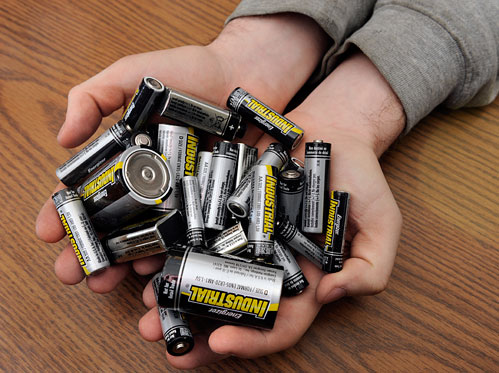Jan. 27, 2011

If you use alkaline batteries in your office, throw them in the trash when they lose their charge. Accumulating them for disposal later may be more detrimental to the environment. Remember, not all single-charge batteries are alkaline. Some (lithium, silver-zinc) contain hazardous substances and should not be added to the trash. They need to be recycled. Photo by Bob Elbert.
It's OK to throw away alkaline batteries . . . But have you considered rechargeable ones instead?
by Anne Krapfl
You pop those alkaline batteries out of your office clock or calculator and drop them in the trash, with a pang of guilt. In this reduce-reuse-recycle era, you're fairly certain there must be an easy recycling option for them . . . isn't there?
Actually, no, there's not.
Recycle the rechargeables
Iowa State recycles rechargeable, lead acid and automotive batteries because they are hazardous waste, there's an economic value to recycling their components -- or both. Rechargeables can be placed in recycling boxes in 1400 Gilman, 74 Durham and the General Services (Central Stores) and EH&S buildings.
If you use alkaline batteries, the best disposal option is to throw them away with your weekly trash, say the experts on campus. Don't collect them in a separate container. They contain no hazardous materials and, pound for pound, would be 10 to 12 times more expensive to recycle than some of the most toxic wastes Iowa State's environmental health and safety department handles, according to assistant director Bill Diesslin.
Diesslin and director of sustainability programs Merry Rankin said they field calls on alkaline battery disposal nearly every week.
"I'm thrilled people are noticing what's going into the trash and want to change that," Rankin said. "At this time, the cost-benefit analysis doesn't support it."
Why can't I recycle alkalines?
Alkaline batteries haven't contained mercury for nearly two decades and contain a small amount of metal -- such as nickel, cobalt, zinc, manganese or silver. The core is zinc chloride. To say they're not recyclable isn't true, but at this point, there is no cost-effective method for de-manufacturing them.Because of this, there is no alkaline battery recycling program on campus. Rankin and Diesslin both cautioned against businesses that accept batteries for recycling. Most likely, they're pulling out the alkalines and adding them to the trash, too.
Separating alkaline batteries from your trash actually might be worse for the environment. In higher concentrations they could cause problems at the landfill. And even in Ames, where lots of garbage is burned and converted to electricity, the weight of alkaline batteries causes them to sift out of the trash bound for the city power plant and end up in a landfill anyway.
Is there an alternative?
Rankin and Diesslin's best advice: If you don't like the idea of throwing away alkaline batteries, don't buy them and stop generating the waste. Instead, buy rechargeable batteries and commit to using them. They're more expensive than one-use batteries, Rankin noted, and users have to monitor them a little more closely. But they do the job, and Rankin said she has used the same set of recyclable batteries for more than seven years.
"As a society, we've got to stop buying one-use things," Diesslin said. "Alkali batteries are a prime example of that."
